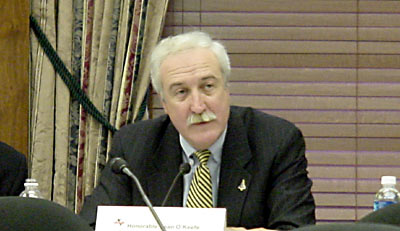In space, no one can hear you explainby Jeff Foust
|
| In both cases NASA has been relatively unwilling to share key details about these plans, and as a result, NASA has been on the defensive most of the time since mid-January. |
However, this chart didn’t placate many people; indeed, the complex multicolored chart may have confused as many people as it enlightened. What many people wanted was not a graph but a single number: NASA’s estimate of how much the overall exploration program would cost. While one could estimate that cost from the chart itself—getting a value of about $170 billion through 2020—NASA steadfastly refused to release that figure.
Indeed, NASA and the White House have, at times, gone to almost comic lengths to avoid divulging that single figure. On February 12 O’Keefe and John Marburger, the President’s science advisor, appeared before the House Science Committee. At one point during the hearing Rep. Bart Gordon (D-TN), the ranking Democrat on the committee, repeatedly asked both O’Keefe and Marburger what the cost of returning humans to the Moon would be. As Gordon politely, but insistently, pressed the question, both witnesses actively avoided giving an answer, creating an exchange reminiscent of Abbott and Costello (or perhaps Larry, Moe, and Curly):
GORDON: So what’s it going to cost by 2020 to go to the moon.
O’KEEFE: You’d have to integrate under that curve to find the total cost but the curve goes up on a line that is quite consistent with the FY ‘04 approved budget…
GORDON: So what does that cost?
O’KEEFE: The mass of budget in the year 2020 according to this would be about $22 billion.
GORDON: What is the cumulative cost, then, to get to the moon by 2020.
O’KEEFE: This includes the entire NASA budget and their components. It looks like only…
GORDON: Again, if I could, did the president never asked you what the cost of the program was going to be?
O’KEEFE: The president understands that we are enabling all future space exploration by putting into place…
MARBURGER: Yes, of course.
GORDON: All right. And what did you tell him?
MARBURGER: And we showed him this chart.
GORDON: OK. All right. And could you tell me—could you add that up and tell me what that means, then?
MARBURGER: I mean, I would have to do some calculations on this chart.
GORDON: So you haven’t done the calculations before?
MARBURGER: Yes. I’m sorry. These precise numbers that you are asking me here are not part of what I carry in my head.
The exchange started well before the above excerpt began, and continued for some time afterwards. In the end Gordon could only extract from Marburger a pledge to provide a written statement explaining how much the return to the Moon would cost and whether the President was informed of that total.
Although any statement provided by Marburger hasn’t been publicized, it’s clear than neither Gordon nor the Science Committee’s chairman, Rep. Sherwood Boehlert (R-NY), are satisfied with the information they’ve received from NASA about the exploration plan. “I remain undecided about whether and how to undertake the exploration program,” Boehlert said in an opening statement during another House Science Committee hearing about the exploration agenda one month later. “I would add that, as the outlines of the likely fiscal 2005 budget become clearer, my questions about the initiative only become more pressing.” At the same hearing, Gordon added that “until I am convinced that the President’s plan to achieve that goal is credible and responsible, I am not prepared to give that plan my support.”
While NASA has been unwilling to supply a single-figure cost estimate for the exploration programs, others outside NASA have not been so shy. Worse, those estimates, often based on inaccurate data or assumptions, have not been flattering to NASA: many have estimated the cost to be on the order of $1 trillion. (See “Whispers in the echo chamber”, in this issue.) While those estimates often have no basis in fact, it has put NASA, and its potential supporters in Congress, on the defensive at a very early stage.
| “If the President won’t promote and defend this space initiative, Congress will be less willing to do so on his behalf,” warned Lampson. |
Indeed, NASA and the Bush Administration have not been very proactive in seeking support for this program. Much has been made of the fact that, since his January 14 speech at NASA Headquarters, the president has not mentioned the plan in public since then, most notably during his State of the Union address the following week. While one could rationalize that silence by noting that Bush had devoted an entire speech to the plan just days earlier, the continuing silence from the administration is proving worrisome to some supporters of the plan.
“The administration must get involved in this process for the initiative to survive,” Rep. Nick Lampson (D-TX), the ranking Democrat of the House Science Committee’s space subcommittee, said in a luncheon address last week at the Goddard Memorial Symposium. He noted that Bush’s silence on the initiative since its introduction “has not gone unnoticed by my colleagues on both sides of the aisle. If the President won’t promote and defend this space initiative, Congress will be less willing to do so on his behalf.”
